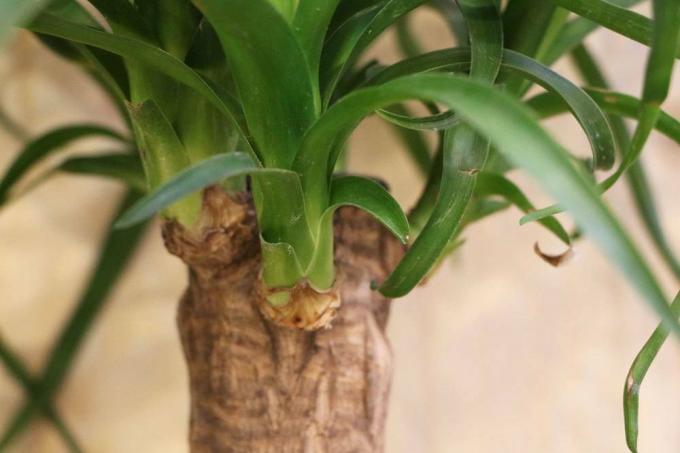
table of contents
- Toxicity
- Toxins
- Saponins
- Poisonous effect
- risk of injury
- Toddlers
- Pets
- Quick reader tips
Many people wonder if the Yucca palm is poisonous. 'Yes and no' is the most accurate answer to this. This article explains what can make the noble plant dangerous under certain circumstances.
Toxicity
Experts do not (yet) agree on the toxicity of the yucca palm (which, by the way, is actually not a palm, but an agave plant). To date, it has not been explicitly confirmed that the plant has a toxic effect, nor has it been given a clear all-clear. Anyone who lives with children or pets can, however, assume that the beautiful yucca is associated with certain risks and dangers for the beings you love.
Is the yucca palm poisonous?
There is no clear answer to this question at the moment. To date there are too few scientific studies or reliable knowledge about the effects of the constituents in the plant. So it is not surprising that the opinions on the subject differ greatly from one another.
Toxins
From botanists, toxicologists or veterinarians to pet owners, gardeners or parents, very different views are represented. Some say the yucca palm is not poisonous. Others, however, expressly advise against keeping the plant in a household with small children or animals.
Tip: In general, the yucca palm is considered non-toxic. However, there are a few things you should keep in mind when dealing with her. Both internal and external properties of the plant have the potential to cause harm to humans and animals.
- Saponins
- sharp-edged leaves
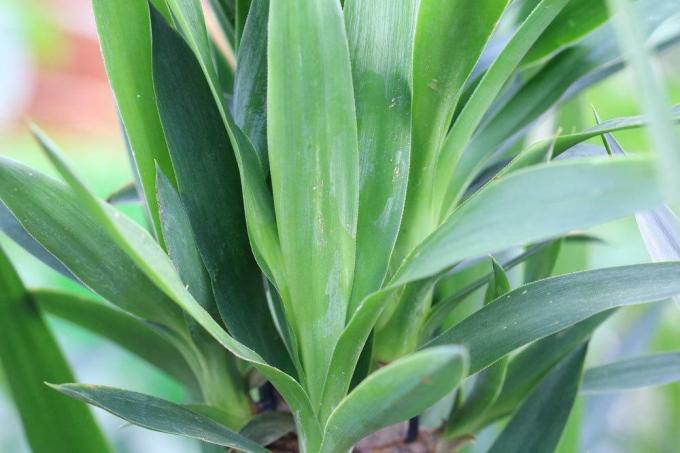
Saponins
Saponins as critical ingredients
Saponins are essential ingredients of the yucca palm (in the trunk and in the leaves). They belong to the secondary plant substances. Specifically, it is a group of the so-called glycosides. The main characteristic of them: if they are shaken in an aqueous solution, they form a foam.
The composition is responsible for this:
- a lipophilic and
- a hydrophilic part
This means:
One part of the saponin molecule is fat-soluble (lipophilic), the other water-soluble (hydrophilic). You can imagine the effect as with a soap. This is also underpinned by the name - sapo is the Latin term for soap. Saponins usually taste bitter.
It is assumed that saponins from the yucca palm (and other plants) serve as so-called defensive substances. In other words: They are supposed to protect the plant from diseases. According to studies, the substances are antifungal (against fungi) and antimicrobial (inhibit bacteria).
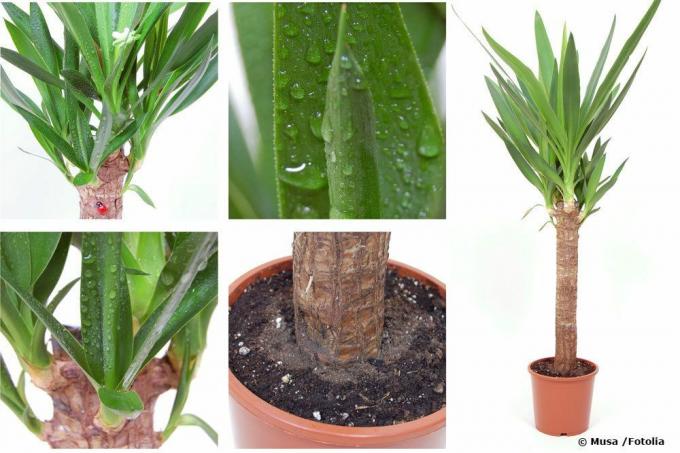
Poisonous effect
But what really matters: With regard to mammals (which are known to include humans), saponins are both harmful and beneficial at the same time.
(Possible) advantages:
- are antibiotic and immune stimulating
- help to combat a fungal attack
- partly lower the cholesterol level
- act against dental caries and lead poisoning
(Possible) disadvantages:
- sometimes severely irritate the mucous membranes
- can cause inflammation
- partially weaken the immune system
- lead to bowel problems and diarrhea
- sometimes break down the red blood cells
- can seriously damage the kidney
Tip: The potential damage caused by saponins are the most important reasons why the yucca palm is repeatedly considered to be poisonous or toxic. is not classified as harmless.
As with all critical substances, it is also the case with saponins that poisoning and symptoms (can) only occur from a certain consumption. Exact information on this is not available. But it can be said with certainty that the tolerance in small children and pets is significantly lower than in adults.
In short:
For babies, children, cats, dogs, guinea pigs, birds, etc. Often, even minimal amounts are sufficient to cause discomfort. Serious illnesses or serious consequences are rare, however.
Typical symptoms of poisoning in animals:
- salivation
- Vomit
- diarrhea
- apathy
If you notice these or other strange behaviors in your pet and have a yucca palm at home, you should visit a veterinarian quickly and mention the plant when talking to the doctor. This may speed up diagnosis and treatment.
Important: The yucca palm is an ornamental plant and NOT suitable for consumption. Contact with the plant is not a problem. One should just not incorporate its components.
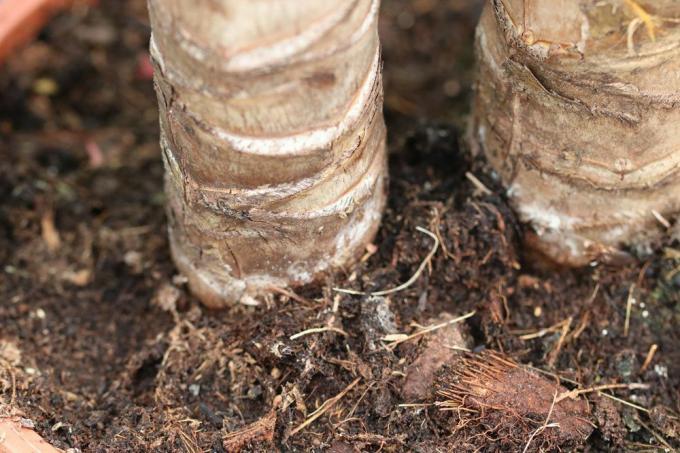
risk of injury
Sharp-edged leaves pose a risk of injury
There is a second point that is crucial in preventing the yucca palm from being considered completely harmless will: The sharp-edged leaves can cause slight to severe injuries if one is careless in handling them acts. Cuts on the hands or on the face, for example in the mouth or the snout, are possible consequences.
Toddlers
Details on the issues related to babies and children
The immune systems of babies and young children are not yet fully developed. This is why adolescents can do little or nothing to counter potentially harmful substances. There is therefore a risk that saponins will quickly lead to symptoms such as gastrointestinal complaints.
It follows:
The best thing to do is to do without yucca palms in your own home if babies and / or small children live in the household. If you still don't want to do without the beautiful plants, you should place the plants in such a way that the kids cannot reach them. It is also important to always keep an eye on the offspring when they are in the room with the yucca palms.
Tip: The risk of damage relates to both careless chewing on the components of the Plant as well as uncontrolled movements with the hands that cause bloody wounds can.
Pets
Details of the issue related to pets
In the wild, cats and dogs hardly ever eat plants that are poisonous to them. Instinct tells them what to keep their paws off of.
The situation is different with "real" pets: They are practically forced to deal with the things that are around them. And since house tigers and fur noses are in no way inferior to small children (and also some adults) in terms of curiosity it does happen that they play with indoor or garden plants every now and then, chewing or chewing on them -scratch.
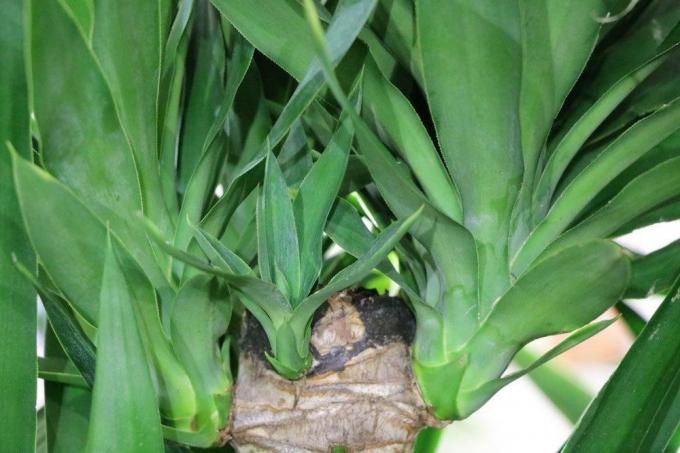
Possible consequences of the dangerous play instinct:
- Poisoning with gastrointestinal complaints
- unpleasant inflammation (saponins)
- Mouth sores (from chewing the leaves)
- Injuries to the paws or face (injuries to the face can come to light if, for example, a cat intensely caresses the sharp-edged leaves of the yucca palm)
It is therefore advisable for people who keep pets to avoid yucca palms or to place them inaccessible. But this is hardly feasible, especially with cats and dogs, which can be very agile and inventive.
Interesting:
Some vets advise cat owners to consciously bring their kitties into contact with the houseplant. The sturdy trunk of the yucca palm offers cats the best conditions to scratch extensively and sharpen their nails.
Every owner must know for himself whether he wants to take the risk or not. can ensure that the pet is always in view when it is playing with the palm. For the safety of the four-legged friend, however, it is advisable to use other scratching options (such as a Scratching post) - especially since mistress and master do not like it when the beautiful plant being ruined.
Quick reader tips
- In principle, the yucca palm is neither poisonous nor harmless
- Plant contains potentially damaging saponins
- Avoid consumption of all ingredients
- Be careful with the sharp-edged leaves of the plant
- Risk of poisoning and injury to children / animals
- then better avoid yucca palms at home
- Otherwise, always watch children / animals carefully
Sources:
https://www.botanikus.de/Botanik3/Ordnung/Yucca/yucca.html


